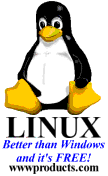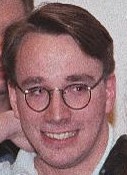 |
 |
 |
| Some Information about Linux & Linus |
| Download a '.wav' file - Linus Torvalds |
| pronounces his operating system's name. |
| ...gotta
love that Scandinavian accent! Lih-nuks, Lye-nuks, Lee-nooks, ...we know what you mean! |
Operating systems, such as Microsoft Windows, OS2, the MacOS, and Linux, give computers the basic ability to process information. They contain the set of commands that make word processors and other applications function. They also control how a computer interacts with the keyboard, monitor, printers, scanners and other hardware.
Linux runs on everything from the 3Com Palm Pilot to parallel super computers. It currently supports systems with the Intel 80386, 80486, and Pentium CPU, including all variations like the 80386SX, 80486SX, 80486DX, and 80486DX2. Non Intel clones work with Linux as well. Linux has also been ported to the Amiga, Atari, DEC Alpha, Apple Power Mac, Sun SPARC equipment, and the 32 bit Strong ARM processors.
An easy, graphical user interface is very important to many users. Flavors of Linux, like Pacific HiTech's TurboLinux, come with user interfaces which are easier than the MacOS or MS Windows, once properly configured. When used with Star Division's "Star Office 5" (free for personal use) Linux becomes a powerful and easy replacement for the office application suites from major vendors like Microsoft, importing and exporting in many formats, including MS Office '97's.
Linux is a Unix clone, so most of the command line stuff is the same or similar to Unix commands. That's why, once you know Linux from the command line, you have a better chance of landing a job on the mainframes and mini mainframes (the "big hardware" machines) which usually use some variation of Unix.
Linus Torvalds is the creator of Linux, and it has increased its market share tremendously in recent years. Linus gives it away for free. He developed it while he was a postgraduate at the University of Helsinki, Finland, in 1991. Together with a large and growing community of advanced programmers, he has been refining it ever since.
Releasing the operating system software for free is not as crazy as it sounds. A free, highly stable multi platform operating system is a great starting point for programmers who wish to develop low maintenance, reliable software. Although the operating system is free, most business users still need to purchase word processors and other software applications. Non-business Linux users can download free-for-personal-use versions of many professional application suites and programs. There is even a movement to make ALL software free. (http://www.OpenSource.org)
Since Linux is free and on so many hardware platforms, the marketing potential for business applications is great. Also, the freely accessible operating system source code means that programmers can access what they need to write their applications correctly and create extremely reliable low maintenance programs. These are among the same programmers who help Linus Torvalds and others keep the Linux operating system great. Hardware manufacturers have similar advantages when releasing drivers for their products.
Reliable software means increased
sales of the programmer's applications. Low maintenance means
better profit margins. Since the operating system is superior and free of charge, users are naturally drawn to it. Because it
operates on so many hardware platforms, more users are also drawn
to the programmer's software applications.
That's another reason why so many top programmers
want to help maintain Linux.
It just makes good business sense.
Businesses who find themselves expanding are migrating to Linux. Besides the intrinsic stability etc., there are huge cost savings with each machine added to the system. Even if you decide to initially purchase a Linux CD instead of the free download, it's less than one quarter of the cost of a Windows NT workstation license, it has an unrestricted number of users, and it works better than NT.
The savings really kick in when you start adding more users. Since the operating system is free, every additional P.C. or workstation you install it on is also free. You just use the same CD to install Linux on every machine. Those savings really add up when you start increasing the number of workstations in your system, installing P.C.'s in other areas, or start expanding and opening other stores.
Linux now runs on some of the most heavily used computers in the world, including research computers at the National Aeronautics and Space Administration (NASA). Linux is also used at the Oak Ridge National Laboratory and runs many of the most powerful Web servers around the world. The water scenes from the movie "Titanic" were rendered using a massively parallel Linux super computer made up of many Digital Alpha processor based PCs. Ten of the commercials during the 1998 Super bowl were rendered using Linux. The list goes on...
Its popularity has spread and Linux is cited by Microsoft as a threat to their operating systems' popularity. Linux has proved to be far more reliable than Microsoft's Windows NT. It's also much less expensive than Unix, which has been the standard for corporate computing for many years.
Not only is the software less expensive, but the stability of the operating system cuts support costs. If there are software problems, hundreds of programmers around the world who work with Linux offer help, usually for free. Linux is catching on because it is very powerful, reliable, simple to use and free. Well known as a Web server operating system, Linux also functions as a network operating system.
For Torvalds, money is not so important. "In Finland, the worth of a person isn't measured in dollars," he says. Instead, he's content with his salary as a software engineer with the secretive Silicon Valley firm called Transmeta. Transmeta will only say that it is doing "cool stuff."
Making Linux work better is nearly a full time hobby for Linus, taking up at least a couple of hours a day. "It's the best kind of hobby. It's a passion. Other people build the Eiffel Tower out of matchsticks."
Linus' intellectual abilities became obvious when he was eight years old. His father, Nils Torvalds, bought him a fairly complicated model ship that Christmas, and intended to build it as a team project, because of the difficulty level. The following morning, Linus had already made it all by himself.
It was his grandfather, Leo Toerngvist, a statistics professor at the University of Helsinki, who had the biggest influence on Linus' computer interest. In the mid 1970s, professor Toerngvist bought one of the first personal computers, a Commodore Vic 20. Linus learned to write computer games at age twelve, mainly because he had to in order to make the Vic 20 work. Soon he was buying books on computer languages and learning more about his grandfather's "fascinating machine." Before long computer and math became Linus' passion.
He avoided his father's efforts to get him interested in basketball etc.. He claims he was "never very good" at sports. His father says that Linus has always been very focused on his goals. "If anyone tried telling him what to do, he would often rebel. He once said that he won't eat sweets. I promised him 100 Finnish marks if he kept that (promise) for a year," Nils Torvalds says. "He did, but the following day (after winning the bet) he took the money and bought sweets for the whole sum."
That rebellious attitude may explain why Linus Torvalds is eager to counterbalance Microsoft's dominance in the operating systems marketplace. He wants computer users to have a choice among several operating systems, not just one from Microsoft.
"I'm not rabid anti Microsoft," he says. "But they make it so hard to compete..."
His father seems proud as he
compares his son's creation of a free computer operating system,
to the political philosopher Thomas Paine* in the 18th century.
Says Nils Torvalds: "Writing Linux in the 20th century could
be as big a contribution to this civil society."
*Thomas Paine - 1737 to 1809 - was
a British born American Revolutionary writer and leader. Among
his many works was the pamphlet "Common Sense" in 1776,
which argued for American independence from Britain. In England
he published "The Rights of Man" in 1791, which was in
defense of the French Revolution.
| WORLD WIDE WEB PRODUCTS | ||
 |
||
| This
site is supported when you click on links and purchase products from The Linux Mall - http://www.LinuxMall.com |
||
 |
||